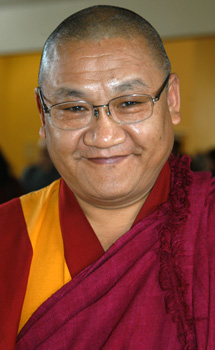Tibetan Buddhist monk calls for compassion
Human rights and economic security are like a person’s left and right foot, needing to be valued in balance, said Geshe Thupten Phelgye, a Tibetan Buddhist monk in the tradition of the Dalai Lama, speaking recently at Gonzaga University.
 |
|---|
| Geshe Thupten Phelgye |
“Both protect happiness, peace and security,” he said, “but overemphasis on economic resources causes suffering.”
He believes that emphasis has led to heavy investment in weapons, “chemicalization” of foods, “hormonization” of animals and mass production of chemicals that poison the air, water and soil.
“Now effects of global warming are in front of our eyes with changes in weather and melting glaciers,” he said.
When he was three, Geshe, now 59, walked over the Himalayas with the Tibetan government-in-exile. He began studies to become a monk at the age of 17. He has founded the Universal Compassion Movement, an organization that seeks to raise awareness and engage people in compassionate practice towards those who suffer and cannot speak for themselves.
He was in Spokane and Newport in March giving presentations at Whitworth University, the Unitarian Universalist Church, Unity Church and the Sravasti Abbey in Newport, and working with local people who are promoting the Universal Compassion Movement in this region.
“There is too much concern about and hunger for material things individually, nationally and globally. Believing advanced countries are advanced in everything, people in poorer countries try to follow westernization,” he said.
Coming to the United States, however, he finds that is not true, because many people are poor, homeless, out of work, obese, lack access to health care and suffer cancers because the food they eat is full of chemicals and hormones. Organic foods are too expensive for poor people.
Too many food producers “are only conscious of money,” he said. “Poor people have no choice but to buy and eat it.”
“In this world of economic capitalism, the one who has the capital has the power and controls policymakers who rule the country,” he said.
Geshe thinks overemphasis on meeting economic needs to bring happiness is misdirected. He calls for raising awareness and raising voices in this democratic country that respects human rights, so people take their power back.
“Freedom of expression and equality before the law are beautiful to read about,” he said, knowing that in some countries people are tortured and systematically denied those rights.
Geshe appreciates the work of non-governmental organizations (NGOs) to bring attention to violations, but also urges governments to live up to the “beautiful words in their constitutions.”
Believing that the United States will continue to lead the world in this century, he said it doesn’t need to fear other powers.
The monk sees the recent economic downturn in light of the Buddhist philosophy that “we need to know that until we taste the bitter, we will not appreciate the taste of the sweet,” he added.
Geshe calls for Americans to do more than vote to choose people for Congress. He challenges them to keep an eye on those they send to represent them to be sure they do represent them.
“Americans need a sense of universal responsibility for their communities, their society and humankind,” he said. “We need to brainstorm in these times to protect the wellbeing and prosperity of this country and the world.
“Compassion and ethical values are key. Too often people lose human and ethical values while running in the race of the material world,” he explained.
Geshe believes people can change if they understand that “what is good for you is good for me and for society.” He sees that the root of all problems is that too much self-concern makes people insecure and fearful.
“When we take away a focus on self and fear, nothing can stop us,” said Geshe.
Knowing Buddhism teaches vegetarianism, but few Buddhists are vegetarian, he wants to inspire people to live the teachings of their faiths.
“It’s a common problem in all religions. We talk of love and compassion, but do not practice the religion we believe in,” he said. “In Tibet, we lived in a high altitude and were unable to grow vegetables, so we ate meat. Now with technology, we can grow vegetables in greenhouses, so more are vegetarian.”
As a Buddhist monk, he knows that living one’s religion means people raising their voices around the world to make a difference.
“In Buddhism, war and killing are never justified, no matter what the cause,” he said. “Many peoples, not just Tibetans, suffer and are oppressed.”
He believes when people’s suffering makes them more conscious of the suffering of others—from human-rights abuses and economic struggles—they become more ethical and compassionate.
“The world’s citizens need to awaken and raise their voices,” he repeated. “We can achieve world peace so we are not at war with ourselves, our families, our communities and our countries. We can bring the world to a better place through awareness, ethical action, education and values that awaken our compassionate nature as sentient beings.
“According to Buddhist teaching, no sentient being is inherently evil. Each has some good qualities,” Geshe said. “We need to bring their compassion to their consciousness, so we can make positive changes.
“We need to both protect human rights and develop the economy to bring peace, happiness and prosperity to everyone,” Geshe challenged.
For information, visit universalcompassion.org.
Copyright © May 2010 - The Fig Tree




